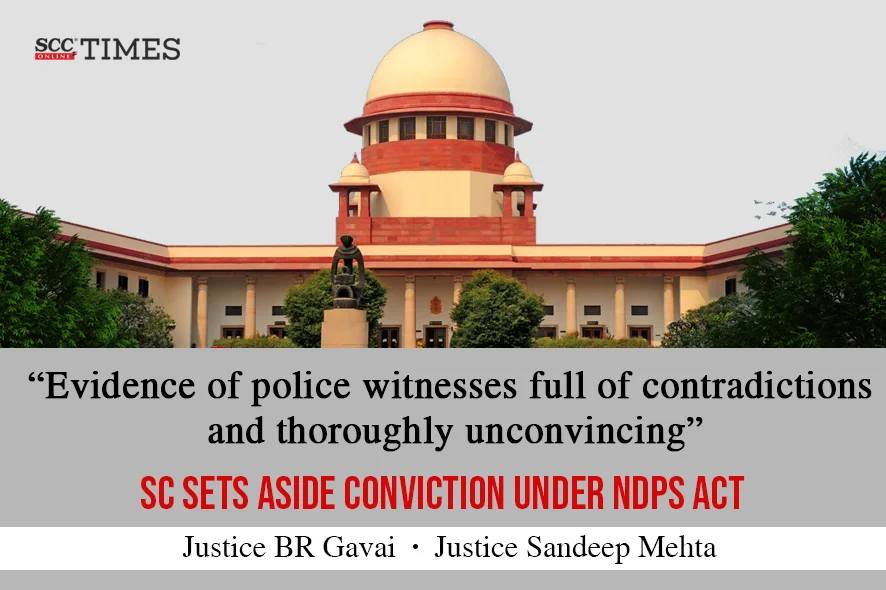Supreme Court: In a criminal appeal against Telangana High Court’s judgment, wherein the convicts’ criminal appeal against the Trial Court’s decision for conviction under Section 8(c) read with Section 20(b)(ii)(c) of the Narcotic Drugs and Psychotropic Substances Act, 1985 (‘NDPS Act’) was rejected, the Division Bench of BR Gavai and Sandeep Mehta*, JJ. allowed the appeal and set aside the impugned judgment.
Background
In the matter at hand, the Inspector of Police (PW-1) received credible information of transportation of ganja by two persons. The convicts were allegedly found present with about 80 kgs on Ganja when the police seized the vehicle in transit. A notice was served under Section 50 of the NDPS Act.
Vide Judgment dated 30-05-2011, the Trial Court convicted and sentenced the convicts to undergo rigorous imprisonment for a period of ten years and to pay a fine of Rs.1,00,000/- each, in default, to suffer simple imprisonment for a period of six months, for offences under Section 8(c) read with Section 20(b)(ii)(c) of the NDPS Act. The High Court, in an appeal against the said conviction, rejected the appeal vide judgment dated 10-11-2022 and affirmed the Trial Court’s decision. Hence, the present appeal.
Decision
Regarding the seizure of the contraband, the Court noted that PW-1 and the seizure panchnama revealed that the contraband was recovered from three bags wherein the ganja as well as green chillies were present. The Court said that PW-1 made no effort to weigh the contraband separately by segregating the chillies, thus, it cannot be said that the recovered ganja actually weighed 80 kgs. The Court also said that no memo was prepared for repacking the seized ganja bundles in new packaging.
The Court said that no explanation was put forth by the prosecution for not examining the witness who were the source of information for the transit of the contraband.
The Court found glaring loopholes in the prosecution case regarding the preparation of the samples of the contraband, safe keeping of the samples right from the time of the seizure till the same reached the FSL, handing over the one of the three samples to one of the convicts, no mention of the sealing of the samples by the PW-1. Therefore, the Court said that these loopholes gave rise to an inescapable inference that the prosecution had miserably failed to prove the required evidence to satisfy the Court regarding the safe custody of the sample packets from the time of the seizure till the same reached the FSL. Further, the Court added that the very possibility of three samples being sent to FSL was negated by the fact that PW-1 handed over one of the three collected samples to the convict. Thus, the Court said that only two samples remained, whereas three samples reached the FSL and this discrepancy completely shattered the prosecution case.
The Court also noted the absence of proceedings under Section 52-A of the NDPS Act by the Investigating Officer, as to preparation of an inventory and obtaining samples in presence of the Magistrate. The Court noted that the prosecution’s case against the convicts was not that they were found in possession of the contraband, rather that the two convicts had conspired sale/purchase of ganja with A-1 and A-2 and the entire prosecution case was based on interrogation noted of the other two accused persons, namely A-1 and A-2.
The Court reiterated that is trite that confession of an accused recorded by a Police Officer is not admissible in evidence as the same is hit by Section 25 of the Evidence Act, 1872. The Court said that neither the Trial Court nor the High Court adverted to this fatal flaw in the prosecution case and proceeded to conviction in a sheerly mechanical manner without there being on iota of evidence on record of the case so as to hold them guilty.
Therefore, the Court said that evidence of the police witnesses was full of contradictions and thoroughly unconvincing. The Court held that the conviction recorded by the Trial Court and affirmed by the High Court was illegal on the face of record and suffered from highest degree of perversity.
The Court allowed the appeals and set aside the impugned Judgment and resultantly acquitted the convicts of all the charges and directed for the release of the convicts.
[Mohd. Khalid v. State of Telangana, 2024 SCC OnLine SC 213, Decided on: 01-03-2024]
Judgment Authored by: Justice Sandeep Mehta
Know Thy Newly Appointed Supreme Court Judge – Justice Sandeep Mehta







